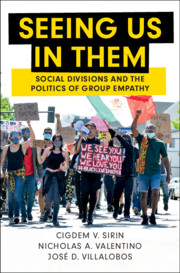Book contents
- Seeing Us in Them
- Cambridge Studies in Public Opinion and Political Psychology
- Seeing Us in Them
- Copyright page
- Dedication
- Contents
- Figures
- Tables
- Prologue
- 1 The Puzzle
- 2 Group Empathy Theory
- 3 Measuring Group Empathy
- 4 An Origin Story
- 5 Group Empathy and Homeland Security
- 6 Group Empathy and the Politics of Immigration
- 7 Group Empathy and Foreign Policy
- 8 Group Empathy in the Era of Trump
- 9 Group Empathy, Brexit, and Public Opinion in the United Kingdom
- 10 Cultivating Group Empathy and Challenging Ethnonationalist Politics
- Epilogue Group Empathy in Response to the COVID-19 Pandemic
- References
- Index
- Books in the series
7 - Group Empathy and Foreign Policy
Published online by Cambridge University Press: 11 March 2021
- Seeing Us in Them
- Cambridge Studies in Public Opinion and Political Psychology
- Seeing Us in Them
- Copyright page
- Dedication
- Contents
- Figures
- Tables
- Prologue
- 1 The Puzzle
- 2 Group Empathy Theory
- 3 Measuring Group Empathy
- 4 An Origin Story
- 5 Group Empathy and Homeland Security
- 6 Group Empathy and the Politics of Immigration
- 7 Group Empathy and Foreign Policy
- 8 Group Empathy in the Era of Trump
- 9 Group Empathy, Brexit, and Public Opinion in the United Kingdom
- 10 Cultivating Group Empathy and Challenging Ethnonationalist Politics
- Epilogue Group Empathy in Response to the COVID-19 Pandemic
- References
- Index
- Books in the series
Summary
Chapter 7 finds a significant relationship between group empathy and foreign policy opinion. Consistent with our previous findings, African Americans and Latinos expressed significantly higher group empathy in general and also specifically toward refugees, Arabs, and Muslims than did whites. Group empathy again helped explain racial/ethnic gaps in policy preferences as well as distinct reactions to experimental vignettes about humanitarian crises in other countries. On average, those high in group empathy attributed higher responsibility to the USA to protect other nations in need and were much more supportive of foreign aid. Group empathy was also associated with increased support for humanitarian assistance, asylum for Syrian civilians, as well as for military intervention to mitigate the humanitarian crisis depicted in our experimental vignettes. Furthermore, group empathy was the strongest predictor of opposition to then-presidential candidate Donald Trump’s proposed Muslim ban, even eclipsing that of partisanship and ideology.
Keywords
- Type
- Chapter
- Information
- Seeing Us in ThemSocial Divisions and the Politics of Group Empathy, pp. 135 - 165Publisher: Cambridge University PressPrint publication year: 2021

